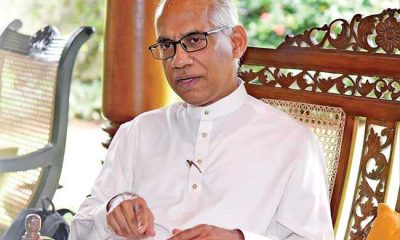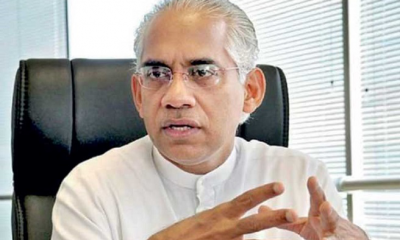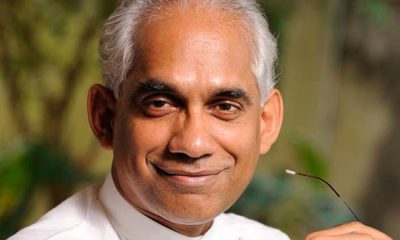Business
Eran outlines practical solutions aimed at resolving corruption and other issues
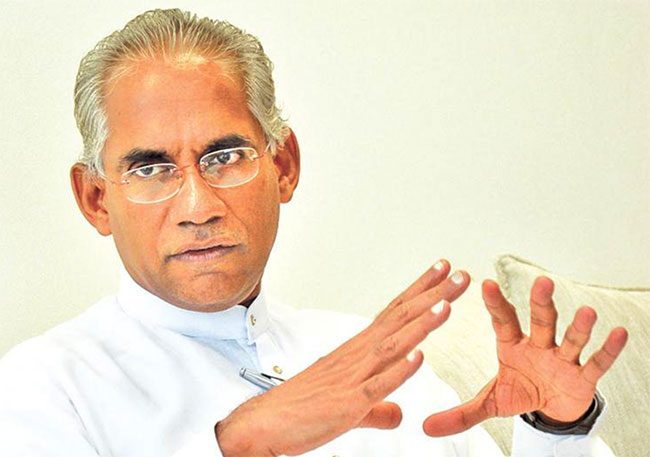
Samagi Jana Balavegaya M.P Eran Wickramaratne recently unveiled the following eleven-point blueprint for the country’s economic development under a future SJB government. Eran Wickramaratne, who is a member of the SJB’s Centre for Economic Policy, outlined his project titled, ‘The Correct Direction of the Economy’ at a forum attended by the local business community, at the Hilton Hotel on February 14.
Following is a transcript of Eran Wickramaratne’s address:
One of the things we will do immediately is making the CBSL independent
We know what happened with printing of money and inflation and the consequences resulting from them.
Monetary Policy of the CBSL will be independent from the Fiscal Policy of Treasury.
The law was drawn in 2019. The then Secretary to Treasury Dr .R.H.S Samaratunge, CBSL Governor Dr. Indrajith Cooomaraswamy, Dr. Nandalal Weerasinge, Minister of Finance at that time Mangala Samaraweera and myself as the State Minister of Finance and other officials were all involved in it. I am calling upon the present government to bring in this piece of legislation even before we come to office, otherwise it will be the first legislation we will enact.
Bribery and corruption
If we are going to build this country, we must focus on some special issues. Bribery and corruption must be stopped.
Politicians like us, high-level officials, must publicize our assets and liabilities. I beg you, you don’t have to wait for the law to come in. As a private member, I have submitted a bill to parliament regarding disclosure of assets and liabilities, and I am asking the government to make that bill law.
Special attention will be focused on anti-corruption measures, as they are a panacea for all ills in governance. Country cannot be changed only by law but by the example of leaders.
We urge the govt. to bring in the law which has already been submitted as a private member’s bill to enable the publicising of assets and liability declarations of politicians and those of senior officials.
There is no need to wait for the draft, I request President Ranil Wickremesinghe.
There is no need for a law to exist; make your declaration of assets and liabilities public.
There are two other former Presidents in parliament, Mahinda Rajapaksa and Maithripala Sirisena, and I request them also to make their assets declarations public. This is an exemplary act that could be gone through forthwith by rulers. Countries don’t change only by law-making, on the contrary, countries change by the examples of leaders.
Therefore, I called upon the present and former Presidents who are sitting in parliament to go public with their Asset Declarations which will compel MPs, such as myself and high officials in this country, to be accountable to the public.
Secondly: Make CIABOC independent. Now it is not independent. When a theft is reported, people are tracked down and police officers are appointed by the government to investigate it. As soon as the government changes, those officials are transferred out of it. It completely disrupts the investigations. This is the type of anti-corruption system this country has. So the law to make the Commission independent is a must.
The third point is: The Star Program. The Stolen Assets Recovery Program, a program of the United Nations. We will bring a law to implement this program. According to that law, even if such stolen resources are hidden in Sri Lanka or in a foreign country, they could be traced and brought back to the country.
The fourth point related to bribery corruption is: For example, today a person could be a minister, tomorrow he may get involved in stealing. Today the Attorney General’s Department could be his counsel, tomorrow the Attorney General could file a case against him. We need to get rid of this system. A conflict of interest is evident here. That is why we demand that there should be an independent prosecutor’s office in this country.
If we put an end to bribery and corruption, others will be fixed automatically. I don’t have to tell you as businessmen, this is an environment where bribes have to be paid from the bottom to top. Therefore, to move our country forward, we must change it and we will change it. These are some measure we intend to do to fight corruption.
The other thing we intend to do is to create;
A Unified Revenue Collection Authority
This is very important. Businessmen do pay taxes. 75 per cent or more of Sri Lanka’s revenue comes from three main institutions, namely, Inland Revenue Dept, Sri Lanka Customs Dept and the Excise Dept, I believe none of you would have accused me or Mangala Samaraweera of stealing a rupee or a dollar, even while we were in office. But the level of corruption in those departments did not go down. Therefore, we can’t rely on individuals, we have to initiate systemic changes. That is why we are going to put in place a Unified Revenue Collection Authority.
As businessmen when you import goods you go to your bank and open an LC and you have to get it cleared. You go to the Customs, I don’t need to tell the rest of the story. Customs only become the clearing hub. Excise and Inland Revenue similarly. You can use technology and these are not new ideas, other countries have done these things. Assessment is done in one place; payment is made centrally; interactions with officials become minimal. Instructions go to the Customs and the payment is centrally made and the goods can be cleared from the Customs.
To be Continued
Business
National Anti-Corruption Action Plan launched with focus on economic recovery
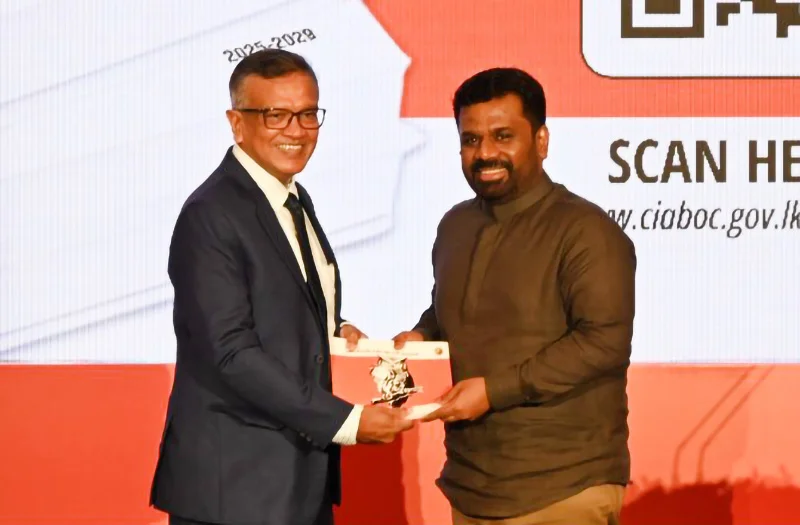
In a decisive move to stabilize Sri Lanka’s economy and rebuild investor confidence, the Commission to Investigate Allegations of Bribery and Corruption (CIABOC) yesterday launched the National Anti-Corruption Action Plan (NACAP) 2025–2029, with a clear focus on promoting transparency, accountability and economic governance.
Developed with the support of the United Nations Development Programme (UNDP) and funded by the government of Japan—contributing nearly USD 900,000—the initiative aims to address corruption as a critical economic barrier.
The launch, attended by President Anura Kumara Dissanayake, Chief Justice Murudu Fernando PC, and high-level diplomatic and institutional representatives, signals a shift in Sri Lanka’s economic reform narrative. The NACAP is seen not just as a governance tool but as an economic recovery strategy designed to attract foreign investment, improve public finance management and rebuild public trust.
R.S.A. Dissanayake, Director General of CIABOC, noted that corruption, “is more than a legal issue—it is an economic cancer that stifles innovation, distorts markets and deters foreign direct investment.” The establishment of Internal Affairs Units (IAUs) within government institutions is expected to bring internal oversight to public spending and performance, improving the efficiency of state services.
Japanese ambassador Akio Isomata stressed that eliminating corruption is essential for Sri Lanka to regain global investor confidence. “Transparency and good governance are fundamental pillars for sustainable economic development, he said. “For Sri Lanka to attract foreign investment and achieve long-term growth, the effective implementation of this Action Plan is crucial.”
Echoing this, UNDP Resident Representative Azusa Kubota highlighted the importance of aligning governance with economic goals. “The NACAP is a roadmap for transforming Sri Lanka’s economic governance, she said. “It will make corruption visible, measurable, and actionable.”
The NACAP is built on four strategic pillars—Preventive Measures, Institutional Strengthening & Enforcement, Education, and Law & Policy Reform—targeting nine priority areas. These include streamlining state enterprise management, modernizing financial crimes investigation and integrating anti-corruption education into economic policymaking.
The implementation timeline is designed with a phased approach: short-term stabilization, medium-term reform and long-term transformation—ensuring consistent progress toward a more accountable and economically resilient state.
“Corruption ends here. The responsibility of eradicating bribery and corruption will not be passed on to the next generation — it will be resolved by our government today, President Anura Kumara Dissanayake said.
The President stressed it marks a turning point in Sri Lanka’s history. “With the launch of the National Anti-Corruption Action Plan 2025–2029, we are drawing a bold line in the sand. No longer will the fight against corruption be tangled in politics or postponed for the future. Public officials now have six months to bring transparency and integrity to their institutions. After May, the law will act decisively and without exception. This is not just policy — it’s a promise. A new era of accountability has begun and it begins with us.”
By Ifham Nizam
Business
Verdant Capital doubles down: $13.5m now powering LOLC Africa’s MSME expansion
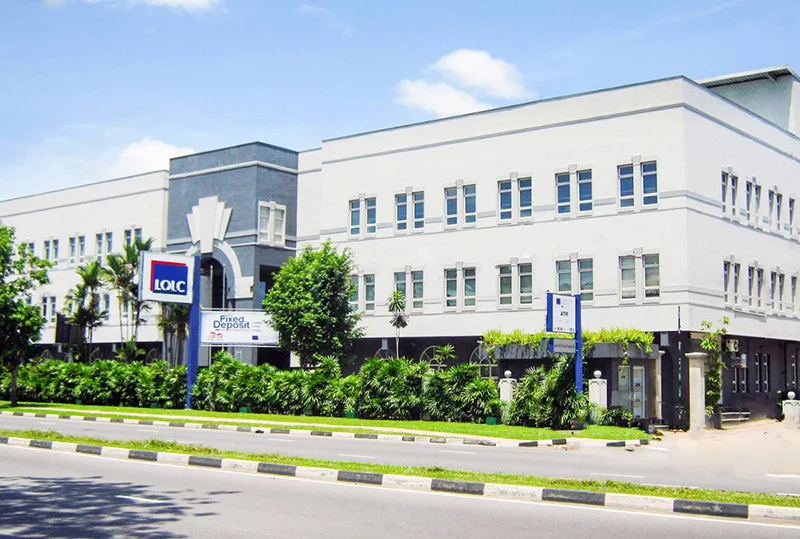
Verdant Capital invests $4.5M more in LOLC Africa, expanding MSME lending across 10 countries and deepening financial inclusion efforts continent-wide.
Verdant Capital has announced that its Verdant Capital Hybrid Fund (the “Fund”) has completed an additional investment of USD 4.5 million in LOLC Africa Singapore Limited (“LOLC Africa”). This investment brings the total investment in LOLC Africa to USD 13.5 million. This follows the initial investment of USD 9 million in LOLC Africa, completed in June 2023. Both investments are structured as holding company loans, and they are being directed towards LOLC Africa’s operating lending subsidiaries in Zambia, Rwanda, Egypt, Kenya, Tanzania, Nigeria, Malawi, Zimbabwe, Ghana, and the Democratic Republic of Congo.
Founded in 1980 in Sri Lanka, LOLC entered the African continent in 2018. Verdant Capital Hybrid Fund is the first external investor in LOLC Africa’s operations, reflecting the Fund’s catalytic investment approach. These investments are driving the expansion of LOLC Africa’s micro, small and medium enterprises (MSMEs) financing footprint across the continent. Additionally, the Fund’s Technical Assistance Facility (TAF), has offered financial support for LOLC Africa’s Social Ratings and Client Protection Pre-Certifications for its subsidiaries in Zambia and Egypt, with further Technical Assistance initiatives in the pipeline.
Business
HNBA’s advisor & partnership channels drive 26% growth
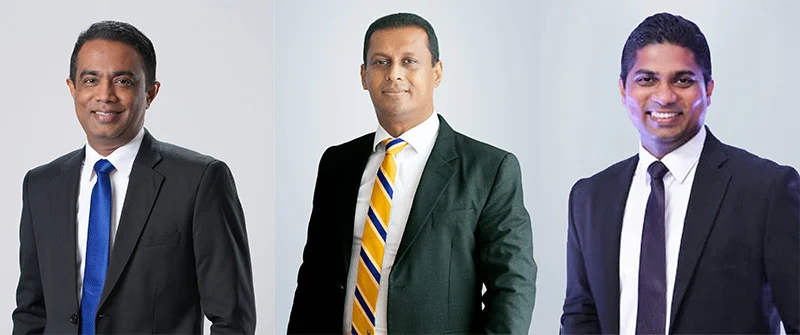
HNB Assurance PLC (HNBA) delivered another year of outstanding financial performance, securing a 7.5% market share and moving a step closer to achieving its ambitious target of 10% market share by 2026. This success was a result of the company’s well-structured strategies, focused on sustainable growth in an increasingly competitive landscape, which yielded impressive results, with its Gross Written Premium (GWP) growing by 26% compared to the previous year.
Over the past four years, HNBA has maintained an average growth rate of 26%, consistently outperforming the industry. A key element of HNBA’s approach has been prioritizing distinctive, value-driven products over high-volume, lower-margin offerings. This strategy has allowed the company to cater to a broader customer base, ensuring inclusivity while maintaining the competitiveness and relevance of its product portfolio
In terms of growth, HNBA’s proactive investment strategy resulted in an 8% growth in investment income, reaching Rs. 6.9 Bn, while Funds Under Management saw a 26% increase. HNBA paid net benefits and claims totaling Rs. 2.9 Bn. The total assets of the company expanded by 24% to Rs. 53.4 Bn, primarily driven by increased financial investments. Additionally, total Life Insurance contract liabilities grew by 25% to Rs. 38.6 Bn, following a surplus transfer of Rs. 1.3 Bn to shareholders.
-

 Business4 days ago
Business4 days agoColombo Coffee wins coveted management awards
-

 Business6 days ago
Business6 days agoDaraz Sri Lanka ushers in the New Year with 4.4 Avurudu Wasi Pro Max – Sri Lanka’s biggest online Avurudu sale
-

 Features5 days ago
Features5 days agoStarlink in the Global South
-

 Business7 days ago
Business7 days agoStrengthening SDG integration into provincial planning and development process
-

 Business6 days ago
Business6 days agoNew SL Sovereign Bonds win foreign investor confidence
-

 Features2 days ago
Features2 days agoSri Lanka’s Foreign Policy amid Geopolitical Transformations: 1990-2024 – Part III
-

 Features5 days ago
Features5 days agoModi’s Sri Lanka Sojourn
-

 Midweek Review2 days ago
Midweek Review2 days agoInequality is killing the Middle Class



